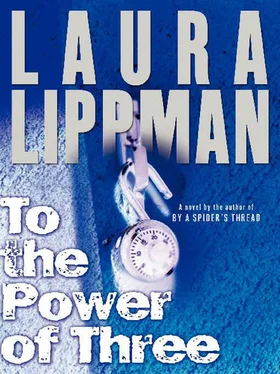Mrs. Kahn came downfifteen minutes later. She was a large woman, but she carried herself with the confidence of someone who had once been thin and attractive.
“Perri was her normal self these past few months,” Eloise Kahn began before either Lenhardt or Infante had a chance to ask her a single question.
“What was normal for Perri?” Lenhardt asked.
“She was like any teenager, moody and rebellious, nothing more. In fact, it makes sense for a high-school senior to get a little irritable. It’s a way of preparing for the transition to college.”
“Had she quarreled with Kat over anything, to your knowledge?”
“Girls don’t really do that,” Eloise Kahn said. “They just…drift apart, for whatever reason. Kat and Perri were heading in different directions. Their differences hadn’t mattered as much when they were younger, but that started to change, and it became harder to overlook the ways in which they were incompatible.”
“Differences?”
“Kat was…well, so mainstream in her attitudes and aspirations. I don’t mean to be unkind…”
In Lenhardt’s experience, people said they didn’t wish to be unkind only when they intended to be extremely unkind but wanted dispensation for their cruelty.
“Kat became more…well, dilettantish after her parents’ divorce. Kat was a charming little girl, but as a teenager all she cared about were the most superficial things. Cheerleading, grades for grades’ sake, but not knowledge. She had a gorgeous soprano voice, but she didn’t want to do anything with it-until she realized that appearing in a school play might round out her college applications. She wanted to get top grades and go to a top college because her father had been preparing her for that since she was small. I don’t know what you’ve heard, but Perri was the one who tired of Kat, not the other way around.”
“We haven’t really gotten into that,” Lenhardt said. “No one’s told us much of anything about the girls’ relationship. We’ve been giving the Hartigans a little space. Her mom said she knew the girls weren’t close anymore, but Kat hadn’t confided in her.”
“Oh.” Mrs. Kahn looked thoughtful, as if considering whether she was at an advantage or a disadvantage, getting to tell this part of the story before anyone else. “Well, some people assumed it was the other way, that Kat and Josie had dropped Perri because she wasn’t a cheerleader who dated jocks. The thing is, Perri has very high standards for herself and her friends. Always has.”
“Who were her friends? Besides Kat Hartigan and the Patel girl?”
This question seemed to pain the mother, and she stammered a bit. “There wasn’t…after Kat and Josie. A lot of kids from drama class, of course. There’s this one boy-not a boyfriend. Just a friend. But very sweet.”
“What’s his name?”
“Dannon Estes, poor thing. His mother…well, honest to God, I think she named him after a cup of yogurt. Literally.”
“That so?” Lenhardt was making a mental note to get to know Dannon Estes.
“His mother is a little unusual, ” Eloise Kahn said, still in the vein of not meaning to be unkind, yet managing it with flying colors. “Sort of a hippie type, but married to the straightest arrow you could imagine. Her second husband, Dannon’s stepfather, and not a great fit, based on what Dannon tells me. The boy has practically lived at our house this past year.”
“Huh.” His neutral, noncommittal noise was intended to keep her talking. Sometimes people could be helpful when they got revved up about inconsequential things.
“It’s funny how much you can determine about someone based on the children’s names. Social class, education. I named Perri after a writer. A wonderful writer who’s also a doctor. I thought it would be a good omen, sort of like christening her left and her right brain at the same time. And she turned out to be good at both things-not writing and science per se, but she had a creative side-drawing, drama, writing. Yet she was great at math. She loved geometry. Have you ever heard of a teenage girl-a normal one, I mean-who loved geometry? Perri used to make up her own theorems for extra credit.”
Eloise Kahn’s words, which had been coming in a great rush, halted abruptly. Lenhardt wondered if she was thinking about whether her daughter would ever again do anything for extra credit. Perri Kahn had one of those injuries that flummoxed doctors, as brain injuries sometimes do. Lenhardt had seen a case, a would-be suicide, who fired a gun straight into his temple and woke up four weeks later, functions virtually unaffected. Yet the shot from the.22 had cut a cruel path through Perri Kahn’s face and brain. What would be the best scenario for Perri’s parents? Alive and in prison? Brain-dead and here? Dead-dead? Could a parent ever wish for a child’s death, under any circumstances?
“Sergeant?”
“Yes, Mrs. Kahn?”
“You believe me, right?”
“About…?”
“That we really didn’t see anything in Perri’s behavior? That there really wasn’t anything to observe or notice? She’s a good kid. Yes, I know every parent says that. The parents of serial killers say that every time. But Perri is truly good . Principled. All we ever asked her to do is stand up for what she thought was right, not just go along with the herd. She wasn’t up in her room playing violent computer games. She didn’t do drugs or drink. She’s a little high-strung. Passionate, sure, but that’s how she was raised to be. The fact is, we’re very proud of her.”
“I’m sure you didn’t notice anything out of the ordinary,” Lenhardt said, and Mrs. Kahn accepted it as the benediction she needed, although his wording had been carefully noncommittal.
As soon as Eloise Kahnboarded the elevator to Shock Trauma, Lenhardt began making a list. “We’ll want a warrant to search her room, by tomorrow if possible. I hope the parents haven’t thought to mess with it. And we’ll want to seize the computer, check to see if the full body of the letter is on it.”
“Wouldn’t it be great,” Infante said, “if she kept an online diary like so many kids now, one where she conveniently wrote all about this in great detail, so we’d know exactly what was going on?”
“We never get that lucky. But there might be e-mails, or some other kinds of records.”
“We need to check the phone.”
“Phone records, sure.”
“Not just the landline,” Infante said. “The cell phone, assuming she has one, and I bet she does, although it wasn’t at the scene. Probably in her car or something.”
“Yeah, maybe the list of incoming and outgoing calls will show something.”
“And the text messages. Those live forever, depending on the provider. These kids are crazy for text messaging.”
“They are?” Lenhardt was refusing to give his kids cell phones until they were in high school and restricted their IM use on the computer, despite Jessica’s contention that this made him the cruelest, meanest father in the universe.
Infante grinned knowingly. “That girl I brought to the departmental Christmas party? She was nineteen.”
“That’s barely legal.”
“Hey, same age difference as you and Marcia. Anyway, it seemed like the only time she ever put her phone down and stopped texting her friends was when we were in bed.”
“Well, yeah,” Lenhardt said. “Everyone knows that’s nothing to call home about.”
“That was soooooooo queer,”Lila said.
“Definitely,” Val agreed, cupping her hands around her cigarette to light it. The breeze was surprisingly stiff this afternoon, even here where it was buffered by a stand of evergreens. “He, like, wouldn’t make it past the first round on American Idol .”
Читать дальше












